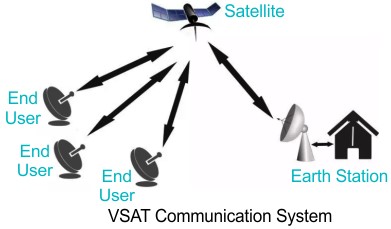🌐 Very Small Aperture Terminal (VSAT): A Gateway to Remote Connectivity
Why Satellite Internet Is Important
Many remote areas have no wired internet. That’s where VSAT helps. A Very Small Aperture Terminal (VSAT) is a system that uses small antennas to send and receive data through satellites. It works where normal internet cannot reach.
Learn more from Hughes Network Systems

How VSAT Works Step by Step
A basic VSAT setup includes:
-
A small dish antenna
-
An outdoor unit (ODU) that talks to the satellite
-
A central hub connected to the internet
Because of this setup, users in remote areas can connect without cables. This makes VSAT great for deserts, mountains, or oceans.
Explore VSAT setup at Intelsat
Where VSAT Is Most Useful
VSAT is used in many fields. Some examples include:
-
🏦 Banks in villages for ATMs and branches
-
🛢️ Oil rigs in the middle of the sea
-
🛒 Shops in remote towns
-
✈️ Planes and ships for communication
-
🛡️ Defense and emergency teams in the field
As you can see, VSAT is not just about internet—it supports vital services too.
VSAT vs. Starlink: Which One Suits You?
| Feature | VSAT (GEO Orbit) | Starlink (LEO Orbit) |
|---|---|---|
| Satellite Height | ~36,000 km | ~550–1,200 km |
| Main Users | Companies, NGOs | Homes, small businesses |
| Installation | Done by experts | Do-it-yourself kit |
| Delay (Latency) | 500–700 ms | 20–50 ms |
| Price | Higher | Medium |
So, Starlink is better for home use. VSAT is ideal for business and security use.
See Starlink’s official tech page
Why Businesses Still Pick VSAT
Even with new tech, companies still choose VSAT. Here’s why:
-
🌍 Works Anywhere – Even in deserts or at sea
-
🔐 Safe and Secure – Uses encrypted signals
-
🛠️ Fast Setup – Installed in just a few days
-
🎥 Real-Time Calls – Great for voice and video
-
📶 Very Reliable – Works even in tough weather
Therefore, VSAT remains a strong option for long-term use.
10 Common Questions About VSAT
1. What is VSAT for?
VSAT brings internet to places with no cable or fiber.
2. Who uses VSAT?
Banks, oil companies, governments, and remote shops.
3. Is VSAT fast?
It’s good for business use, but slower than fiber or Starlink.
4. What size is the VSAT dish?
From 0.75 to 2.4 meters wide.
5. Is it secure?
Yes, data is sent through encrypted networks.
6. Can it be used for voice calls?
Yes, it supports internet calling (VoIP).
7. How much delay is there?
Around 500–700 milliseconds due to distance.
8. Who installs it?
Experts install and align the equipment.
9. What’s the cost?
More expensive than regular internet, but more stable.
10. Does bad weather affect it?
Heavy rain may reduce signal, but new systems reduce this problem.stems reduce downtime.

